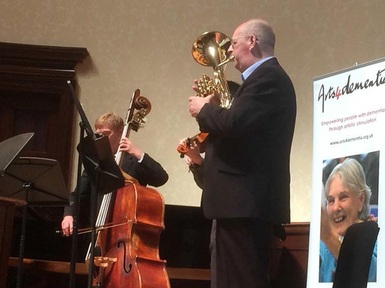Young Onset Dementia: 'We need to dwell on the things we can do, not on the things we can't'
At the age of 61, Chris Norris was diagnosed with frontotemporal dementia – an unusual type of dementia that affects around 16,000 people in Britain.

Frontotemporal dementia tends to affect the frontal and temporal lobes of the brain (the front and sides) in particular. These parts of the brain are largely responsible for language and the ability to plan and organise, and are vital in controlling behaviour.
Married with two grown-up children, Chris first noticed something wasn’t quite right when he was working as a driving examiner and was finding it increasingly difficult to process the sequential order of driving test car journeys.
“This difficulty became particularly pronounced when I had to write a report and de-brief the learner about what happened in the journey and its significant events,” he says.
In 2012 Chris went to see his GP, who referred him to a memory clinic, where he received his diagnosis.
Getting a diagnosis gave him “almost a sense of relief” as he knew at last what was wrong with him.
He says: “Before my diagnosis, it was suggested that I could have depression, because the symptoms can sometimes be similar – but I knew that it wasn’t that.”
He plays the tenor trumpet in various brass bands and has found music has been crucial in helping him to cope with the disease.
'I have dementia but dementia does not have me'
“By keeping my music making going, I can prove to others, I have dementia but dementia does not have me,” he says.
This year he took part in a series of weekly orchestral workshops run by Arts 4 Dementia led by musicians of the English Chamber Orchestra (ECO) for musicians with early-stage dementia, which culminated in a symposium.
The musicians had transposed the Bach Chorale in large print to suit Chris’s E flat horn.
For Chris, who had been a horn player formerly in the Life Guards mounted band and founder of the Kent Police Band, the experience was incredibly important.
“While you’re playing, whatever else is happening in your life that takes second place, because you’re there in that moment.” He has found that “as the notes float away, so do my cares”.
He found he liked “the informality of it, the comradeship. I felt part of it straight away. I accessed skills I’d thought had gone.”
To his dismay, he has found “it is getting harder to read music. I know how to read each individual note rather than the whole pattern or sequence.
'With dementia, the oldest memories and skills are the last we lose'
“One of my difficulties is transposition. When you have dementia, a task that is easily managed in earlier life can become confusing. With dementia, the oldest memories and skills are the last we lose.”
The English Chamber Orchestra were keen to help Chris override issues of sequencing and transposition. When Chris hit a transpositional challenge, he read the bass clef as a treble clef and added a sharp. The orchestra transposed music to suit his horn and tested the experience of transposing themselves.
As well as playing the tenor horn, Chris is heavily involved with the Forget Me Nots group at the Kent and Medway NHS and Social Care Partnership Trust in east Kent, where 20 people with dementia meet regularly. They speak to people who have just received a diagnosis and give advice and guidance.
He has also taken part in a project called Dementia Diaries, which is a national series of audio diaries documenting the day to day lives of people living with dementia.
Continuing to play music and spreading awareness about the debilitating disease has helped Chris, who recently told his story at the launch of Arts 4 Dementia's report 'Music Reawakening'.
He says: “I’ve developed coping strategies and my motto is to live life well – dementia doesn’t stop me.”
“We need to dwell on the things we can do, not on the things we can’t.”
Arts 4 Dementia's report 'Music Reawakening, Musicianship and Access for Early to Mid Stage Dementia - The Way Forward' giving guidance on spreading music practice for people affected by early to mid stage dementia and their carers can be viewed at http://www.arts4dementia.org.uk/music-reawakening-report
Latest Features News
 25-Nov-19
2019 Election: Boris Johnson leaves social care in 'too difficult box' but Labour vows to end 'crisis'
25-Nov-19
2019 Election: Boris Johnson leaves social care in 'too difficult box' but Labour vows to end 'crisis'
 18-Oct-19
Podcast: Wendy Mitchell and dementia: 'My biggest fear is not knowing who my daughters are'
18-Oct-19
Podcast: Wendy Mitchell and dementia: 'My biggest fear is not knowing who my daughters are'
 27-Sep-19
Exclusive: Care minister backs care workers' call for time off to grieve and attend funerals
27-Sep-19
Exclusive: Care minister backs care workers' call for time off to grieve and attend funerals
 19-Sep-19
Podcast: Gyles Brandreth says poetry helps ward off dementia
19-Sep-19
Podcast: Gyles Brandreth says poetry helps ward off dementia
 30-Aug-19
Edinburgh Fringe funnyman joins comics facing toughest audience at care home gig
30-Aug-19
Edinburgh Fringe funnyman joins comics facing toughest audience at care home gig